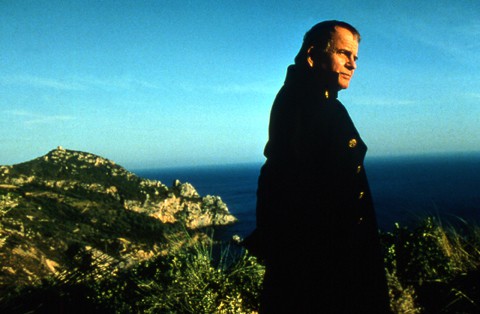The latest in the long line of films on Napoleon I (see our First Empire filmography), The Emperor's New Clothes, directed by Alan Taylor (Palookaville), is to come out on general release at the end of January 2004. It stars Ian Holm as Napoleon and Iben Hjejle as the women he comes to love, and it was produced by Uberto Pasolini (of Full Monty fame).
As the press pack states, the film was 'loosely' based on Simon Ley's renowned first novel The Death of Napoleon, (1) a sustained elegy on the wisdom of recognising the important things in life, such as love, happiness, modest success, and of seeing for what they really are the chimaeras of power and military glory. A quotation from Paul Valéry's Mauvaises pensées et autres, placed at the head of the book, sets the scene: “It's a shame to see a great mind, like that of Napoleon, dedicated to insignificant things, such as empires, great events, the thunder of canon and shouting, and believing in gloire, posterity and Caesar, – to see him concerned with the inconstant masses and the surface things of peoples… Didn't he see that what was really important was SOMETHING ELSE?”
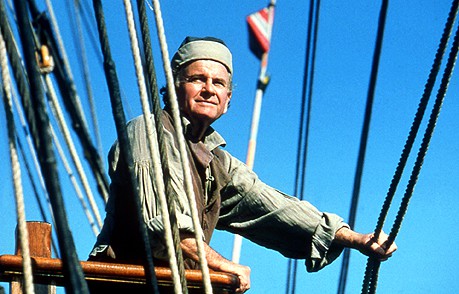 At the beginning of the novel we see Napoleon on a boat (posing as a cabin hand by the name of Eugene Lenormand) heading back to France after having escaped from Saint Helena. A double has been arranged at Longwood so that his English jailors will not notice the fact that the 'General Bonaparte' is missing – unlike in the film, this episode concerning the double is relegated to a footnote. The doppelganger's only role in the book is to die.
At the beginning of the novel we see Napoleon on a boat (posing as a cabin hand by the name of Eugene Lenormand) heading back to France after having escaped from Saint Helena. A double has been arranged at Longwood so that his English jailors will not notice the fact that the 'General Bonaparte' is missing – unlike in the film, this episode concerning the double is relegated to a footnote. The doppelganger's only role in the book is to die.
The ship voyage takes many days. Napoleon is portrayed as passive, biding his time, thinking only of returning to power. On his slow return to the civilised world, we learn more concerning the daring plan of substitution, escape and return to power. It was hatched by a brilliant but obscure mathematician (who however died after having set it in motion). Napoleon was to be brought back to France by a secret network of Bonapartists. And the matter was so secret that only the inventor knew everyone in it (the individual members were allowed to know only one person above them and one below). But the plan goes awry – and the author of it is dead. The ship does not dock as planned at Marseilles (in the film this is changed to Brest), it carries on to Belgium, and as result the chain of the secret network is broken. Napoleon is on his own.
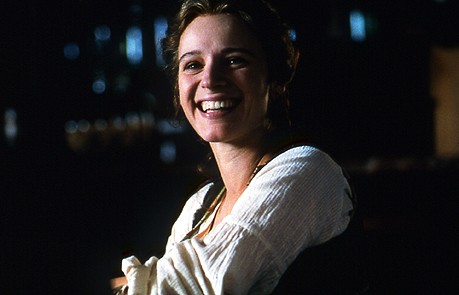 He decides to try to reach Paris. On the way he visits the battlefield of Waterloo – where he discovers to his horror that the Napoleon that everyone remembers (or tries to sell) is not him at all. On being presented with a room marked 'Napoleon slept here', the fallen emperor is horrified to realise that he had in fact never been there. He begins to see that (as we see later) the idea of Napoleon has overtaken the reality.
He decides to try to reach Paris. On the way he visits the battlefield of Waterloo – where he discovers to his horror that the Napoleon that everyone remembers (or tries to sell) is not him at all. On being presented with a room marked 'Napoleon slept here', the fallen emperor is horrified to realise that he had in fact never been there. He begins to see that (as we see later) the idea of Napoleon has overtaken the reality.
Travelling to Paris in a public coach, he is stopped and arrested because he has forgotten to pay his hotel bill in Brussels. He is however saved by an ex-grognard, Justin Bommel, ex-adjudant of the Ier Infaterie des Departments du Nord, (now gendarme), who recognises him, rescues him from prison, and gives him the address of a Bonapartist in Paris, a certain Truchaut. Once in Paris, Napoleon reaches the house only to find a woman, the Bonapartist's widow, Truchaut being dead. She is called Autruche (Ostrich), a backwards version of her married name Truch-aut, and she is attempting (very unsuccesfully) to manage a melon selling business. The name given her in the film, 'Pumpkin', matches not only the melons but also the slightly mocking/slightly sympathetic attitude the people around her have for her. She has a strong southern accent – and the melons are reminiscent of the sun of the Mediterranean and of course Corsica. She is, as Leys says, 'a simple and warm soul'.
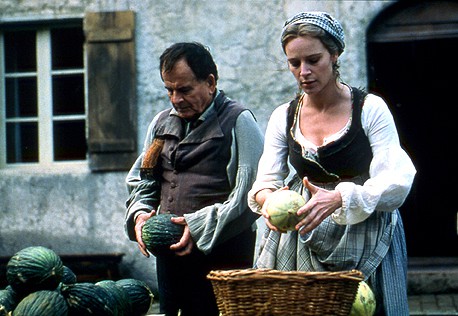 As Napoleon hears at length from the widow Ostrich, her melon business is going from bad to worse. The fruit is rotting and no buyers can be found. Into this tale of woe is brought the cataclysmic news that 'the emperor is dead', and the men who bring the news (it turns out) were Truchaut's friends and fellow Bonapartists – one, the Surgeon Major, is a lodger in the house. There then begins in the Ostrich's house an impromtu wake for the deceased figure of all their longing, in which Napoleon participates. And his tears are real, for he realises that with the death of his double, his plans are significantly skewed.
As Napoleon hears at length from the widow Ostrich, her melon business is going from bad to worse. The fruit is rotting and no buyers can be found. Into this tale of woe is brought the cataclysmic news that 'the emperor is dead', and the men who bring the news (it turns out) were Truchaut's friends and fellow Bonapartists – one, the Surgeon Major, is a lodger in the house. There then begins in the Ostrich's house an impromtu wake for the deceased figure of all their longing, in which Napoleon participates. And his tears are real, for he realises that with the death of his double, his plans are significantly skewed.
This is the turning point in the book. Napoleon's realisation of his true situation is at once hilarious and also tragic: “In the days that followed, the full horror of his [Napoleon's] new situation appeared to him even more clearly. In a Europe incapable of finding a single opponent who could measure up to him; the breaking up of states, the creation of empires, the overthrowing of kings, all that was in the end nothing to him… But now, the stupid death of an obscure sub-lieutenant on a deserted rock at the other end of the world had managed to set in his path the most formidable and most unexpected of rivals conceivable: himself. And what's worse, it was not merely against Napoleon that Napoleon had to make his way, but against a Napoleon larger than life – the remembrance of Napoleon.”
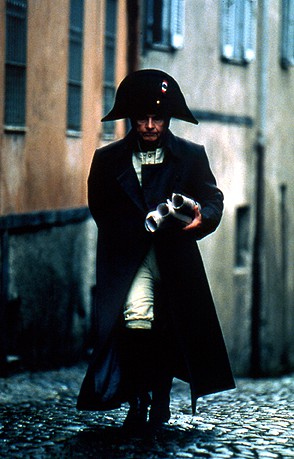 There then follows the second key scene. Napoleon has been usurped by the idea of himself. Now he shows himself capable of turning his extraordinary talents to matters more humble, but nevertheless crucial in the lives of those around him. In order to avoid financial ruin, the Ostrich has to sell a recent arrival of melons. But the weather is hot, the melons are rotting and noone wants to buy the fruit. Napoleon decides to intervene and as a strategist for the sale of melons he is naturally sans-pareil. Leys gives Napoleon a speech where he explains his plan to those who are to help the Ostrich, and the emperor in him shines through. Leys has Napoleon warm gradually to his theme, having him start with a looser general strategy which becomes more specific – and as a result more military. Napoleon triumphantly concludes in terms barely related to melon selling, “if we drive in with all our energy into a gap on this discontinuous line, we shall get through … straight to the soft underbelly of the city.”
There then follows the second key scene. Napoleon has been usurped by the idea of himself. Now he shows himself capable of turning his extraordinary talents to matters more humble, but nevertheless crucial in the lives of those around him. In order to avoid financial ruin, the Ostrich has to sell a recent arrival of melons. But the weather is hot, the melons are rotting and noone wants to buy the fruit. Napoleon decides to intervene and as a strategist for the sale of melons he is naturally sans-pareil. Leys gives Napoleon a speech where he explains his plan to those who are to help the Ostrich, and the emperor in him shines through. Leys has Napoleon warm gradually to his theme, having him start with a looser general strategy which becomes more specific – and as a result more military. Napoleon triumphantly concludes in terms barely related to melon selling, “if we drive in with all our energy into a gap on this discontinuous line, we shall get through … straight to the soft underbelly of the city.”
Through Napoleon's agency, the Ostrich's business becomes ever more prosperous – and she of course begins to be attracted to him. Napoleon (how could he not?) shows himself to be an excellent trader, happy to solve every single logistical problem that arises concerning the sale of melons. But of course his success does not go well with Truchaut's old friend, the Surgeon Major. The ex-grande armée Surgeon recognises that Eugene is in fact Napoleon (because of the dreadful efficacy of his melon-selling strategy), but this recognition is painful for him. He cannot reconcile the great emperor for whom he waited so long with someone who is apparently content to become a seller of melons. As Leys puts it, for the surgeon “it felt a little like being a Christian to whom God had just revealed that he was thinking about retiring”. The bottom has fallen out of his world. Nor is it simply of a question of fallen grandeur; Napoleon had also taken the only woman with whom the surgeon might ever have had a chance to find love.
So the Surgeon 'deserts', and when Napoleon tries to bring him back, he keeps repeating 'it's too late'. Then, without telling the fallen emperor where they are going, he takes him by the collar and almost drags him through the early evening to the walled garden of a large house some way from the Ostrich's house and abandons him there. As Napoleon discovers, it is a lunatic asylum whose only inmates are men who think they are Napoleon. Horrified at the sight, Napoleon flees the asylum, and is seized by the conviction that he must reveal to the Ostrich who he really is. When he does so, however, she thinks him certifiable and makes secret plans to invite the director of the asylum to meet Napoleon. On returning home one afternoon and finding the director of the asylum in tête-à-tête with the Ostrich, he realises that she thinks he is mad. He is furious, but sees no way of revealing his real identity – and a rift has come between him and the Ostrich.
Napoleon therefore decides that the Ostrich must be forgotten about, that he must seek his destiny. So begins to consider how he might try to enlist the powers of the day (all his old ministers) to support him. He starts a massive research plan, which involves long hours in libraries on research and long hours in cafes writing – he is rarely at home. Returning home late one night he is caught in a rain storm and catches a fever, which leads to his death several days later. In his final delirium, he realises with horror that he does not know the first name of the Ostrich. In a desperate attempt to discover it, he in fact asks her 'what is my name' and though realising his error he is too weak to rectify it. She says 'Eugene, it's Eugene'. But seeing that this is not what he wants to know, she bends closer and whispers low in his ear 'You are Napoleon, you are my Napoleon'.
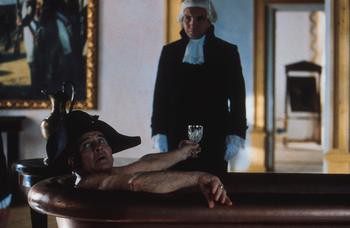 The film, The Emperor's New Clothes, takes this story and makes certain, significant changes. Firstly the situation of Napoleon's double on Saint Helena is blown up so as to become a complete subplot. Though relegated to footnote in the book, this part of the story takes up a good deal of the film, providing an opportunity for slapstick humour as a counterpoint for the more serious nature of Napoleon's attempt to rise once again from the ashes. Indeed, this idea of the Napoleon story as faintly ridiculous goes right back to the tradition of the British caricaturists of Gillray and Cruickshank – see the Anti-Napoleon special dossier here.
The film, The Emperor's New Clothes, takes this story and makes certain, significant changes. Firstly the situation of Napoleon's double on Saint Helena is blown up so as to become a complete subplot. Though relegated to footnote in the book, this part of the story takes up a good deal of the film, providing an opportunity for slapstick humour as a counterpoint for the more serious nature of Napoleon's attempt to rise once again from the ashes. Indeed, this idea of the Napoleon story as faintly ridiculous goes right back to the tradition of the British caricaturists of Gillray and Cruickshank – see the Anti-Napoleon special dossier here.
Another example of this poking fun is the meeting and escape at dawn with the sergeant, Justin Bommel. Whereas in the book, this encounter is touching and pathetic – Bommel was not quite at Waterloo – and the reader is given a glimpse of the demi-soldes, the Bonapartists in hiding, the worship for the fallen emperor. In the film, Bommel is presented as a buffoon; when bidding his emperor farewell he clumsily manages almost to suffocate Napoleon in his cloak.
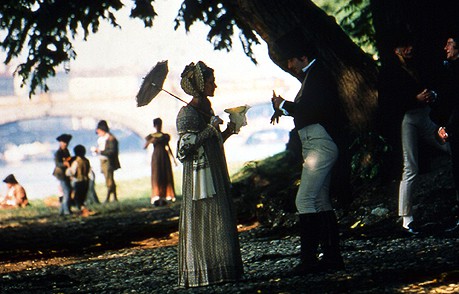 Other key differences are the characters of the Ostrich – in the film 'Pumpkin' – and the little boy, named Gerard (played by Tom Watson), a stray whom Pumpkin has adopted. Pumpkin is made to be Dutch – perhaps because the actress playing that part, Iben Hjejle, is Danish and her English accent is more believeable as Dutch. As is hinted at in the book, but fully developed in the film, she is a maternal figure, who collects things she can mother. The boy, Gerard, created from the troop of children which in the book are always in the background in Pumpkin's house, is employed as a means of revealing this motherly tendency. As befits the show business motto, 'make them laugh, make them cry', Gerard adds pathos to the possibility that Pumpkin is about to be thrown in the streets.
Other key differences are the characters of the Ostrich – in the film 'Pumpkin' – and the little boy, named Gerard (played by Tom Watson), a stray whom Pumpkin has adopted. Pumpkin is made to be Dutch – perhaps because the actress playing that part, Iben Hjejle, is Danish and her English accent is more believeable as Dutch. As is hinted at in the book, but fully developed in the film, she is a maternal figure, who collects things she can mother. The boy, Gerard, created from the troop of children which in the book are always in the background in Pumpkin's house, is employed as a means of revealing this motherly tendency. As befits the show business motto, 'make them laugh, make them cry', Gerard adds pathos to the possibility that Pumpkin is about to be thrown in the streets.
On the other hand, the Surgeon Major (played by Tim McInnerny), given the name Lambert, is the villain of the piece. And in this respect as regards the book, his role is changed completely. He does not recognise Napoleon through the latter's actions but finds out after sneakily searching the lining of Napoleon's cloak and discovering a miniature. The prime reason for the Surgeon's defection from Napoleon is not (as in the book) his disappointment that the emperor is not what he was hoping he would be, but rather because he is jealous with respect to Pumpkin. A key change here in the development of the plot is the placing of the announcement of the death of Napoleon's doppelganger on Saint Helena. In the book this comes before the successful melon episode – indeed it is the reason why Napoleon begins to stay at Pumpkin's house. In the film, this anouncement is delayed until after the melon episode – presumably to give more time for the antics on Saint Helena, and secondly in order to add some tension to the conflict between Napoleon and Lambert. Furthermore, once the false Napoleon is dead, any attempt by Eugene to claim his real identity will only lay himself open to the charge of delusion (especially in Lambert's eyes). There then follows the moment in the asylum and Napoleon's subsequent realisation that his attempt to re-become Napoleon is misguided. He resigns himself to the SOMETHING ELSE of the Paul Valéry introduction.
Although the film is significantly different from the book, nevertheless, there would seem to be much that would interest, touch and amuse the Napoleon fan. Roll on next Friday, 30 January, 2004, when the film is released in the UK.


